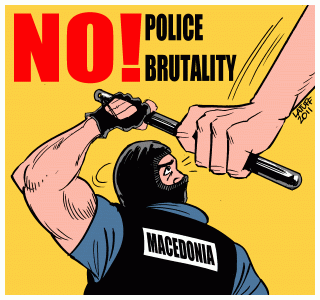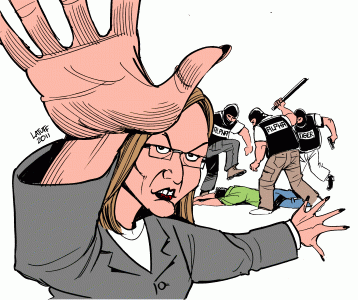This post is part of our special coverage Macedonia Protests 2011.
As more people act upon the awareness that the increasing visibility abroad or among foreigners within Macedonia is an important aspect of the ongoing protests, translations and original tweets/blog posts in various languages begin to appear, providing a more comprehensive picture of the developments.
For instance, Tina, a Twitter user, posted a timeline of the Martin Neshkovski case in English as “CSI: Democracy not found,” while Andre Valé posted more information in Portuguese.

No Police Brutality! – caricature by Brasilian cartoonist Carlos Latuff* made for and used as a poster by protesters in Macedonia
Marjan Zabrchanec wrote about the benefits gained from the protests so far, in Macedonian and in English (with the help of Ana Bojadzievska):
The protests, initiated after the brutal killing of Martin Neshkovski by a member of the Macedonian police forces, contributed to the Macedonian society in several ways. What we achieved was mostly a benefit for the youth, but certain influence has been exercised over political parties, civil society organizations and of course the Ministry of Interior.
For the sake of a simpler classification in the sea of information, i will try to emphasize five positive outcomes we already gained and other three, which I believe will follow.
What did we get from protests against the police brutality?
01. Empowerment of the individual
As never before, a huge mass of individuals publicly expressed their stance against the Ministry of Interior; an institution, considered to be the greatest intimidator of free citizens. Regardless whether one joins the protest every day at 18:00 pm in front of the monument of Mother Teresa, or is simply active in the online community by posting a symbolic logo against the brutality of the police on his Facebook or Twitter profile, the benefit from an open expression of discontent is enormous. The individual is encouraged and able to act against fear.02. Unity of very diverse individuals
The great amazement by the positive atmosphere during the protests is shared by everyone. Citizens keep on noting that such unification of the different groupings has never been experienced earlier. On Friday, the [5th day] of the protest, the massiveness of the movement became evident. More than 3,000 citizens, mostly young, gathered with a joint message towards the institutions: “Stop the brutality over the individual.” As never before, a same message came from many different people. At the protests I personally recognized citizens from 50 different organizations, apolitical individuals, citizens with no political preference, members of VMRO-DPMNE and SDSM, members of DUI and DPA, members of other political parties, but also citizens that get engaged around social issues for the very first time. Although during the preparation of the protests there were no intentional calls towards the different ethnic communities that live in Macedonia, at the protests I saw Macedonians, Albanians, Roma, Vlachs, Serbs, Bosniaks, Croats and others. The protests brought a spontaneous integration of citizens of the Republic of Macedonia.
03. Clarification of the murder of Martin Neshkovski
Citizens managed to reveal a murder that the Ministry intended to hide. Pressure from citizens led to slow illumination of the details related to the murder of Martin. I am not talking about a final clarification, but about increasingly growing exposure of information in public, which would have for sure remained in the hidden files of the MOI, hadn't this outbreak of civil activism happened. The attempts of the officials to cover up the brutal murder failed, and contradictoriness is increasing with each successive statement coming from the Spokesman of the MOI, Ivo Kotevski.
04. The power of Twitter emerged
It is presumptuous to claim that Twitter is organizing the protests. Twitter is neither an organization, nor a media that possesses centralized sources of information. Behind Twitter are the critical citizens who manage to articulate their attitudes in 140-characters text. While the number of users in Macedonia is still small, Twitter emerged as a platform, a social network that is difficult to monitor, control and censor. I believe that Twitter is still unknown to the MOI which was the reason why nobody could anticipate the protests and is still not able to stop them. Although initially Facebook remained quiet, after the 6-days protests more citizens were encouraged and started using Facebook to express their discontent. The number of pages, groups and events that are calling for solidarity and protest against the police brutality is constantly increasing. At the same time, we shouldn't undermine the Facebook activity of the MOI expressed through attempts to censor the calls for protest (Fortunately, with no major consequences thus far).
05. Citizens over the parties
“We are not a party” is the message that is constantly being repeated during the protests. This is not the main message of the protest, but it is a protective mechanism which, unfortunately, must be repeated so we can prevent the attempts of political parties to marginalize or manipulate the pure civic activism. The non-partisan character of the movement was understood and accepted by all participants of the protests; those who are members of different parties and those who disagree with the principles of the pluralist democratic system in the first place. The message “We are not party” managed to unite the citizens, as much as the message “Stop police brutality” did. As quite common for non-partisan actions, this action supported the dominance of the civic over the partisan and called for activism without violence and excluding hate speech. The nonviolent protest against the police violence can serve as an example for both parties and state institutions.
I believe that this list may be expanded with other benefits gained in the last 7 days. But I also believe that the civil action”;#protestiram #martin” will not stop here, and will strive to achieve at least other three goals that I describe below.
These are the 3 most common requests of citizens, put in an order in which I think they can be achieved with continuous pressure.
I. Identification and punishment for all culprits in the murder of Martin Neshkovski
I believe that the MOI will succumb to the pressure from citizens and undertake all the necessary procedures to fully clarify the case, detect and reveal all the members of the police forces that were witnesses or accomplices in the murder.
II. Resignation or dismissal of the officials in charge in the MOI
If the protests continue, I believe that a resignation or dismissal of the Minister of Interior Gordana Jankulovska and/or the Deputy Minister and Spokesman of the Ministry, Ivo Kotevski will follow. These prospects were announced in the editor's comment [mk] of the pro-government daily newspaper Dnevnik, as well as in the statement of the sleeping President of the Republic [mk], that the institutions received the message coming from citizens.
III. Reform of the special police forces
After statements from the OSCE and the Ombudsman [mk], a continuing pressure could bring democratization within the MOI, expressed through publicly presented plan for reform of the special police force and its quick implementation.
Finally, regardless whether the protests will continue or not, regardless whether the Ministry will request the abolition of all Facebook groups calling for protests and further use the authority of foreign analysts to kill civic activism [mk], young people have achieved success, perhaps the largest in plural past 20 years Macedonia.

A caricature by Carlos Latuff* depicting Macedonian Minister of Interior Affairs Gordana Jankulovska
Meanwhile, people participating in the protest movement have launched several new blogs/websites in Macedonian, including:
- Justice for Martin [mk]
- Protestira.me (“We protest”) is aggregating content about the protests against police brutality, including links to articles in various languages. An interesting feature deconstructs [mk] the anti-protest propaganda, including the news that on June 10, a policeman's gun was stolen by a masked group that hid in the crowd. According to this site, at the time of the incident reported by the police, the protest march was several kilometers away.
- Tamara Atanasoska opened a personal blog to post [mk] a moving account of her experience of joining the first day of protests as a desperate move to provide support for witnesses of the murder.
* Carlos Latuff allows “free reproduction” of his cartoons.
This post is part of our special coverage Macedonia Protests 2011.









10 comments